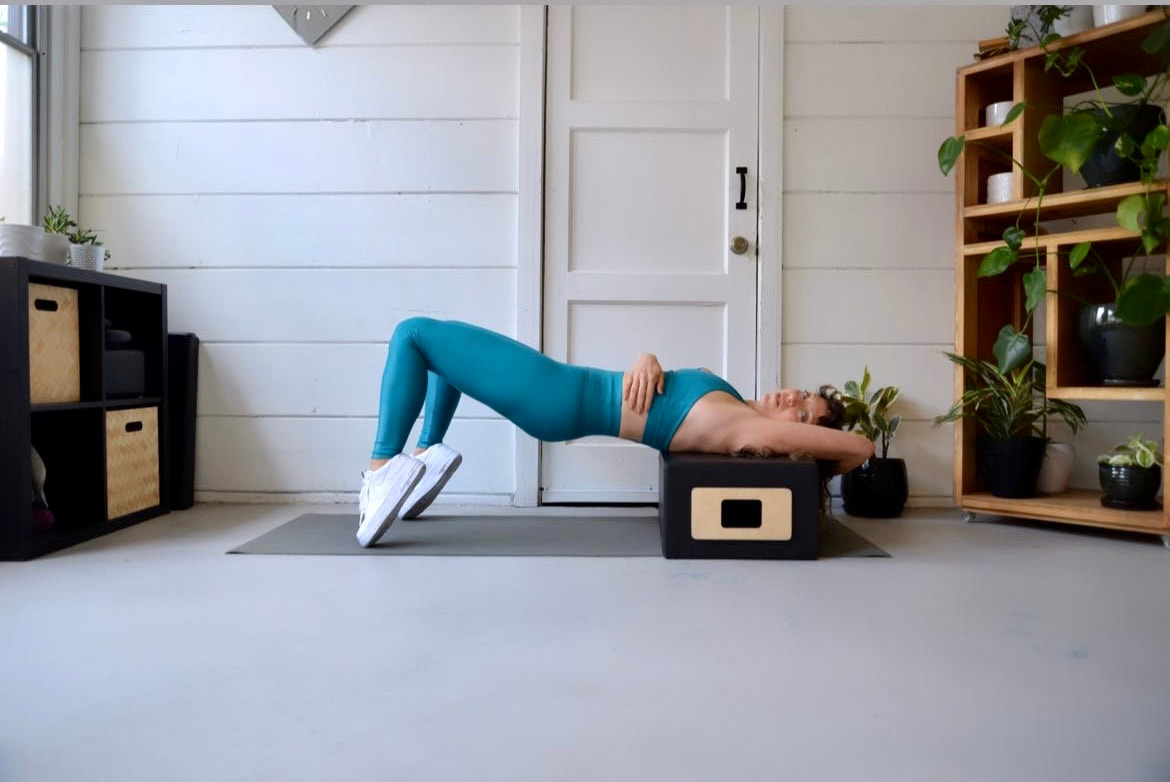 "Heaven can wait, but Hell is too far to go, somewhere between what you need and what you know" These lyrics are from the Charlotte Gainsbourg song, "Heaven Can Wait" give it a listen HERE. I love this so much because it illustrates how hard change truly is. Change is unfamiliar. She's saying that Heaven can wait, meaning she's not fully ready to let go of the old ways. But hell is too far to go- she knows how things will turn out if she goes back. There is a part of change that isn't talked about which is the middle which inevitably can be quite messy. I know this is a hectic time but also change does not magically happen on January 1. This aspect of growth can feel so discouraging old habits start looking pretty tempting. Without perspective, it can seem like no progress is being made, or maybe things are even getting worse. Here are some things to keep in mind: The Comeback is Always Bigger Than the Setback Plan for setbacks. If you know they will happen and accept they are part of the process you're less likely to give up. It may feel like you are in the same place you started but progress is not linear it actually goes in an upward spiral. Try and find one aspect of progress that you made. You didn't work out last week but you went for a long walk? You ordered out more than you wanted this month but maybe cooked a healthy recipe in your rotation the other days? Did you reach out for help when you had a rough day? Acknowledging progress has a motivating effect. Become the Main Character in Your Story If you have spent any time on social media you know I didn't just make this up, but as the kids also say I am here for it. Recognize you are in the Eye of the Tiger montage just like in the movies. The lead tries and fails repeatedly but eventually wins the race and gets the guy or girl. Mistakes are how we learn. Stay present and recognize which behaviors feel good in the moment but make you feel utterly awful later and vice versa. Eventually you'll clear the wall and emerge victorious. The Universe Hates a Void As a semi-highly functioning dopamine addict (if you missed This is Your Brain on Pilates read it here) I love a to-do list. I love knowing what I'm doing next. I planned a relative's visit to Los Angeles by day, time and neighborhood not because she asked me to but because I enjoyed it. But that is how we get stuck. If we are always having to fill our schedule with commitments and our closets with things and our stomachs with snacks it doesn't leave any space for what we really want. Try to hang out for a bit in between in that space in between what you need and what you know. If you need support with any of your goals email [email protected] for more information on Nutrition Therapy services. To see what clients are saying about the Aligned program click here. If you know someone who may benefit from this information please feel free to share. Stay tuned for more! xo, Elaine
1 Comment
In a previous blog I talked about how in times of stress our bodies go into fight or flight mode. This mode triggers our stress hormones which sometimes can feel quite addictive, giving us a high feeling. To read more about how stress can affect our hunger signals and what to do about it click HERE. Positive events can also increase these hormones, referred to as eustress. Thanksgiving is a perfect example: the travel, the family, last minute grocery shopping. It makes sense why you'd crave a sweet or salty treat to keep the blood sugar levels going (cue Grandmaster Flash & Mellie Mel's White Lines). The trick here is not to demonize sugar OR isolate yourself in a meditative state until January. Read on to learn for some suggestions on how to stay grounded just in time to prepare for December holidays... Rule #1 Eat like you love yourself At family gatherings I always used to hear family members say, "Tomorrow I'm going to get back on the wagon." Which usually meant the Weight Watchers wagon. Overeating past the point of comfort today and then depriving yourself tomorrow may not be as painful as throwing yourself from a moving vehicle but it can definitely wreak havoc both mentally and physically. Personally, if I have to be on a wagon I'd prefer it to be a G-Wagon. Sometimes you will be in the mood to go fast, sometimes you will prefer to slow down and park in the French countryside somewhere and enjoy a cheese board. Allow yourself foods you love that are nourishing and satisfying, enjoy them, stop when you are full and live to eat leftovers another day. Rule #2 Eat like a Cordon Bleu Chef Holiday foods are not typically what we would make on an everyday basis which makes them special. However, getting out of our routine can be a little upsetting to the digestive system. Certain nostalgic foods can be richer or have more sodium than we are used to. If you've ever had onion dip with Lipton's French Onion Soup Mix and sour cream then you know what I am talking about. The famous Le Cordon Bleu School states that when the 5 flavors of salty, sweet, sour, bitter and umami are balanced the entire dining experience is elevated. I love adding this Fennel Apple Salad with Walnuts to a Thanksgiving meal for a crisp and refreshing compliment to creamy mashed potatoes and savory stuffings. Not only will getting some veggies give you nutrients, fiber and hydration that will aid digestion but you will enjoy all the other foods even more. So I would say have that onion dip if you love it but pair it with some crudités to make that creamy texture pop. Rule #3 Eat like a Nutrition Expert Just as you wouldn't go to the hairdresser for a toothache, unless your Aunt Wanda is a nutritionist then you shouldn't feel obligated to eat according to the latest article she read in Better Homes & Gardens. Also worth mentioning: nutritionist or not no one should be giving advice unless specifically asked. Assuming I won't be with you at Thanksgiving realize that now you are the authority. Now I have a ton of suggestions that work for me like taking five deep breaths before a meal or having some mint tea after to settle digestion or going for a walk. But here is the reality-perhaps answering that last work text is going to give you more peace of mind than leaving it for Monday, and if you are going to Thanksgiving in Iowa no one is taking a walk in 7 degree weather. Maybe holding a toddler and sipping tea sounds more stressful than soothing. Take some time to think about what makes you feel good and what helps you tune into your inner expert. Recognize that creating a healthy relationship with food is a practice. Always reach out for help if you could use support bridging structure and flexibility. Email [email protected] if you would like more information on our Aligned Program. xx, Elaine Picture this... Its the end of the day, you're not really hungry but maybe in the mood for a snack. You go to the fridge and reach for a piece of cheese, some crackers, maybe some hummus. Twenty minutes later you've consumed half the box of crackers, the better part of the cheese and hummus along with a leftover breakfast burrito and some pasta from the night before. Throw in maybe a few handfuls of granola and a couple of protein bars covered with peanut butter because you don't keep "bad" foods in the house. You head off to sleep but maybe don't sleep the whole night through because you're waking up with an upset stomach. The next morning you feel dehydrated and puffy and not hungry at all. Until the evening hits... During times of stress the body goes into fight or flight mode. This mode triggers our stress hormones which sometimes can feel quite addictive, giving us a high feeling that helps to numb pain and other physical sensations such as hunger. But here is the catch- what goes up must come down. When we numb our feelings of hunger we also are not able to feel our fullness. When the adrenaline high wears off our appetite seems uncontrollable. Furthermore, chronic stress can longterm elevate the hormones that make us feel hungry. This is our body compensating for the uncertainty of when the next meal or chance to rest is coming. Have you even been through a break up where you stopped eating and lost ten pounds only to quickly regain it in the following months? That's why. What should you do if you don't feel hungry OR are ravenously hungry during the day? Follow my tips below to help manage stress. The goal is to shift our nervous system from fight or flight to rest and digest. Tip #1 Schedule Breaks If we are going 100 miles an hour all day long chances are the night will come to a screeching halt right into a retaining wall made out of a giant burrito supreme, a large side of guac and chips and a quesadilla to seal the deal. Also, if you have a long day and no rest in sight mealtime may be the only semi-relaxing time built into your day. You may eat more in one sitting than you physically need just to soothe yourself. The Fix: Do schedule regular mealtimes 4-5 hours apart. Even if you only have 15 minutes spend at least one minute of that break practicing breathing exercises. I tell clients to do a five senses meditation where they close their eyes and try to identify what they are feeling. Give this feeling a smell, sound, temperature, texture and color. If you are still not hungry read a couple pages of a book or do something relaxing. Pumping the brakes regularly a few times throughout the day ensures you don't crash. Rule #2 Feel it to Heal it A certain level of decorum is required to function as an adult in this world however constantly having to "put on a happy face" or power through difficult situations is a real energy suck. When we suppress our emotions we are more likely to feel no connection to our physical hunger which can manifest as zero appetite or bottomless pit (or any combination of the two). When we allow ourselves to feel our feelings we can get clear and take appropriate action. Getting to the root cause of what is messing with your appetite is way more sustainable than constantly triaging emotions by starving them or stuffing them down. The Fix: Take a piece of paper and write down all your negative emotions, judgements about yourself, reasons why you don't deserve what you truly want. Let this be free flowing. Write about the guy who tried to negotiate your pay rate down, the friend who said you should't eat potatoes because they are too "starchy." Write about how your mom said in the 8th grade your thighs were too big to wear flare jeans or how your nose was too big to wear your hair parted down the middle. Scribble on about how you're pissed at yourself for getting that parking ticket and being late to that appointment. Let it all out. The rip it up and throw it out with the cat litter or burn it safely if that's your thing. Tip #3 Problem Solve What we have here is a classic chicken and the egg situation. Are we unhappy because we overate or did we overeat because we are unhappy? We have established not all problems can be solved by eating or skipping meals however feeling out of control around food can wear away at our self-esteem. A better relationship with rest and nourishment affects all our other relationships and vice versa. The Fix: Now it's time to focus on what makes our bodies feel good. Continue the mindfulness tips above and set appropriate boundaries, whether is is not overscheduling yourself or cutting back on going to the in-laws if it's going to create a binge situation. Plan foods you like that make you feel good and that are easy to digest and try to work those into your regular mealtimes. Recognize that at first reconnecting with physical hunger is a process and especially if you are out of practice this may take a second. Always reach out for help if you could use support bridging structure and flexibility. Email [email protected] if you would like more information on our Aligned Program. xx, Elaine These days lemon water, gratitude journals, meditation, morning yoga and the $17 Erewhon Smoothie are all ubiquitous components of an aspirational regimen. I definitely love investing time and resources in health, but the pressure to be "that girl" is overwhelming. For many of my clients a typical morning might be waking up to a toddler taking over their side of the bed or a four hour conference call to London.
So here is your pared-down routine: Close your eyes, take a deep breath. Remember one to three things you did in the past 24 hours that made you proud. Anything that made you feel good counts. Did you take a walk around the block before your dentist appointment? Maybe you drank a liter of water? Did you listen to your body at dinner and stop when you were full? Here's why this is important. When we recognize an achievement dopamine is released, elevating our mood. When dopamine is present, we are more likely to make better choices because our brains want more of that feel-good neurotransmitter. Experts encourage smaller, more actionable goals to set off a positive domino effect. If our to-do list is too overwhelming the apprehension of failure can actually shut off our dopamine. Drops in dopamine levels have the opposite effect causing procrastination and paralysis. Which explains why if your morning routine isn't fully Instagrammable it can be tempting to throw in the Egyptian cotton towel. If you're looking for and easy way to get your fix Starr Pilates On Demand classes offer videos of all lengths. You can do one at a time or mix and match for a longer workout. For the latest video click HERE. To make it even more accessible take advantage of the 14 Day Free Trial, cancel anytime. In my last blog post I set out a perfectly sensible framework for when it comes to mindful movement and healthy eating (click this if you missed it). But here is the truth: rules are made to be broken and sometimes "being bad" feels so good. Read on for how to embrace your inner rebel and look cooler than ever. Rule #1 Plan meals and snacks about 3-5 hours apart It's true that waiting too long in between meals can cause all sorts of headaches, poor decision making, hangry arguments and even mess with your cortisol levels. From a metabolic viewpoint the idea of eating regular meals is that when our bodies go too long without fuel we and we have used up all our blood glucose our bodies will then turn to our stores to supply energy. Muscle is easier for our bodies to break down than fat. Since muscle burns more calories than fat, constantly skipping meals then overeating puts our bodies in a vicious cycle which can slow metabolism. Break the rule When you're legitimately not hungry don't stress it. Look, your metabolism will not grind to a screeching halt if you don't pull off to the nearest Starbucks and have a protein plate every 180 minutes. If you know you have a meal or snack coming up in the next hour or so and you know you have enough fuel to get you there, no biggie. Also, say you waited a bit too long and had an extra piece of bread at your meal... you're not going to gain a pound of fat instantaneously. Trust your body, it knows what to do. Rule #2 Plan meals you like It's crazy how diet/ health foods have changed throughout the years. Remember when bagels were healthy because they were low-fat? Or when kale wasn't even a glimmer in our eye? The point is that we tend to like things because they are familiar. Because mindful eating is ultimately more sustainable than dieting it is easy to confuse mindful eating with habit. But sometimes the things that seem "healthy" or feel good temporarily aren't moving the needle literally and figuratively. This leaves us feeling frustrated, burned out and confused. Break the rule Time to do a meal audit. The way I do this with clients is I look at what they normally eat. Then I look at what their dream meal would be. Trail mix is healthy. Protein bars are healthy. But so are tacos. Comparatively, looking at the nutritional information you'll get the same amount of calories yet more vegetables, lean protein, healthy carbohydrates with tacos. Also, clients are less likely to overeat later in the day because they "just had a snack for lunch." Just as self-care isn't all bubble baths and face masks mindful eating isn't all pizza and doughnuts. Taking a closer look at your meals isn't always sexy but it can payoff big time. #3 Move your body in a way that you love at least three days a week to lower stress levels and boost endorphins This one. Exercise has so many benefits, from stress reduction to injury rehabilitation and prevention. It can decrease lower back and shoulder pain. It increases flexibility. Studies show that physical fitness is a better marker of health than weight. This means that a body that exercises regularly but is at a higher weight is scientifically shown to be less at risk for heart disease and diabetes than a smaller body that is sedentary and doesn't exercise. Click the link here to learn more about HAES principals. Break the rule When you are tired. When you are injured. When you are blowing off friends for exercise. When you've already worked out a few times this week and you don't feel like it. If you're looking to create that ellusive caloric deficit keep in mind exercise only makes up a small portion of your calorie burn for the day. Also, the more you exercise, the better your body gets at conserving calories. Most clients in turn exercise more to compensate for this, which in turn can mess with our body's ability to recognize our hunger and fullness cues. It's a slippery slope, so cut yourself some slack. If you need help bridging structure and flexibility email [email protected] for more information on Nutrition Therapy services. To see what clients are saying about the Aligned program click here. Stay tuned for more! xo, Elaine  As we move away from diet culture and towards body acceptance I find many of my clients feeling confused. Can you still love and accept your body and want to change it? And if so, how to do this in a kind and sustainable way? The answer, is yes, you can! But first, I feel it is important to break down differences between dieting and mindful eating and learn how to find a structure that works for you. There are two main differences between dieting and mindful eating. The first difference is that dieting relies on a set of concrete external rules such as what, when and how much to eat. Mindful eating is a practice of observing the body's sensations while eating. When, what and how much food is determined by the person eating responding to internal hunger and fullness cues. The second difference is that dieting is primarily a results-oriented process, meaning that the goal of a diet is usually to lose a certain amount of weight or to manage certain health conditions such as heart disease or diabetes. Studies have shown while dieting may work in the short term that a very small percentage of subjects who lost weight while dieting were able to maintain the weight loss. Weight cycling can also affect mood, causing depression in many chronic dieters. Mindful eating is more process-oriented, meaning that mindful eating is a long-term practice that is honed by each eating experience. According to Joseph B. Nelson in Mindful Eating: The Art of Presence While You Eat, "Mindful eating is not directly linked with weight loss, however experts believe with a mindful approach, the person’s choices often are to eat less, savor eating more, and select foods consistent with desirable health benefits." Experts also believe even if the goal is to manage a certain health concern mindful eating may have better long-term results than dieting. Sooooo what if you feel your best a few pounds lighter or want to rock a six pack for the summer? Considering females start dieting at the age of 8, jumping straight into mindful eating may be like going zero to 90. The trick is to use what we know about how the body responds to too much or not enough food to create a structure that works. Structure done well actually is freeing. We are not talking about rigid rules like only wearing pink on Wednesdays or not eating carbs after 7pm. We are talking about guidelines. Read below for some of my favorites: Plan meals and snacks about 3-5 hours apart to prevent blood sugar crashes When blood sugar gets too low forget savoring our bodies need food like yesterday and carbs and sugar are the fastest way to get blood glucose back up. We are also more likely to overeat past the point of comfortable fullness and in a quantity that our body can't assimilate. Whatever we can't use gets stored for later regardless if it was a carbohydrate, protein or fat. Plan meals you like Look I know quinoa is very healthy but I have to add so much dried fruit and dressing by the time I'm done I could have had a side of French fries and been satisfied with less. A good rule of thumb is to use the Plate method. The plate method means one half of your plate is veggies or fruits, one quarter is protein, one quarter carbohydrate. So yes one quarter French fries add a salad with some protein and enjoy. Move your body in a way that you love at least three days a week to lower stress levels and boost endorphins Studies have shown when we feel better we make better food choices. Also, lean muscle tissue boosts metabolic rate, exercise improves posture. Good posture makes you look taller and therefore leaner regardless of body weight. Exercise is only one piece of the puzzle so make sure you're being mindful if you're crazy hungry after workouts. If you need help bridging structure and flexibility please email [email protected] for more information on Nutrition Therapy services. Also, if you know someone who may benefit from this information please feel free to share! I recently read "The Power of Habit" by Charles Duhigg. He explains the key to changing any unwanted behavior is substituting it with a newer and hopefully healthier action. Modifying any routine will take willpower until it becomes automatic. Willpower is defined as: "The ability to delay gratification, resisting short-term temptations in order to meet long term goals." Duhigg cites an interesting study that tells us more about willpower. Two sets of subjects were placed in two separate rooms. Each room had a table with a plate of fresh baked cookies. The first set of subjects was allowed to eat as many cookies as they want. The second group told not to eat the cookies under any circumstances. The cookies were removed, then both groups given a set of mathematical problems. The group that had eaten the cookies scored higher. What do these findings mean? Eat the cookies? Cookies make you smarter? Scientists believe the subjects who had to employ willpower to resist the cookies had less mental energy to devote to the second task. This study explains why high-functioning, high-achieving folks may turn to compensatory behaviors. It can be really hard to swap a doughnut for a nap if you just spent an afternoon cajoling a moody teenager or just worked a 12 hour day. So what to do if you want to change a habit? Number one: Duhigg recommends modifying one behavior at a time. Imagine trying to keep multiple beach balls underwater all at once. It's nearly impossible to sustain for a long period. It can take two to four months or even longer for habits to become ingrained. Small steps ensure new behaviors become second nature. Number two: See the cookie, want the cookie, eat the cookie, enjoy the cookie. When we classify foods as "good" or "bad" we risk depleting our willpower. The more you resist, the more the craving persists and the more you wear down your willpower. This explains why when you finally give in and have said cookie you're more likely to feel like you've "blown it" and raid the cupboard for other forbidden treats. Number three: awareness. Sometimes you want a cookie. Sometimes you want a nap, a vacation, or a new pair of shoes. It may not be feasible in the middle of the workday to go for a walk or draw a hot bath. The goal is to check in with yourself, and identify what it is you are really craving and try to work towards that. In my experience, this is the most difficult aspect for clients to implement but also the most effective. When we get our other needs met we are less likely to overly rely on food to cope. Willpower may be an integral part in building behaviors that make us feel good long-term, however it is important to understand how our brains work and set realistic, compassionate and informed goals along the way. If you'd like support creating better habits email [email protected] for more information. Here's a super quick video to engage the low abdominals while massaging the neck and shoulders. Let me know what you think and comment what video should be done next!
Neck and shoulder pain is the worst. When muscles are tight, it has the effect of leaving the dome light on in your car- slowly draining the battery even when it's sitting in the driveway overnight. If you have 7 minutes grab a mat, a pillow, bolster or blanket and follow this video. Make sure to join Starr Pilates monthly on-demand subscription HERE for more videos. Let me know what you think below.
Introducing... our Starr Pilates Referral Program. When you sign up for our Virtual Mat or On-Demand Classes you'll get a personalized link to share with friends. Get credit for every friend who signs up. Sign up here: Starr Pilates Virtual Mini Mat It's just about 40 minutes long which gives you a chance to sweat, stretch, smoothie and shower before your next zoom. Or try a mini on-demand class only $5-7 for a limited time HERE. All this is made possible by our new scheduling system! Let me know how it goes! xx, Elaine |
Details
Archives
November 2022
Categories
All
Archives
November 2022
Categories
All
|






 RSS Feed
RSS Feed